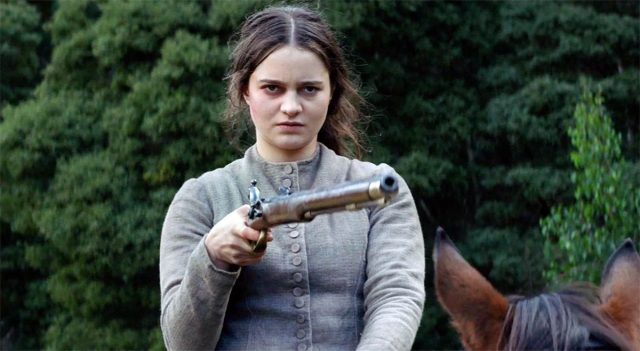Sundance 2019: The Nightingale, by David Bax

It’s clear very early on in Jennifer Kent’s The Nightingale that things aren’t likely to go well for Clare (Aisling Franciosi), our protagonist. In a small military outpost in 1825 Van Diemen’s Land (now known as Tasmania), she’s an ex-convict and de facto slave, chanteuse, barmaid and anything (and everything) else to commanding officer Lieutenant Hawkins (Sam Claflin) who dangles her freedom and return to Ireland in front of her like a carrot. In the moments before the first time we see her raped, she is called to Hawkins’ quarters and Kent frames her with a horsewhip hanging on the wall just over her shoulder. Hawkins sees her as his property and he does not treat his property kindly.
Hawkins’ evil quickly becomes even greater than we initially imagined when, following his second rape of Clare, he commands his men to kill her husband and infant child. From that point on, The Nightingale becomes a revenge Western in which Clare teams up with a native guide, Billy (Baykali Ganambarr), for an especially brutal and ideologically thorny take on the odd couple buddy cop format, all in the 1.33:1 aspect ratio required of all serious independent films these days.
Kent is, of course, best known for 2014’s sublime and terrifying The Babadook. The Nightingale may not be a horror film but she hasn’t left her genre roots behind. The shrouds of darkness that fall around Clare and Billy on their nighttimes journeys through the island’s wild threaten to contain unknown terrors. And the nightmares that plague Clare are as scary as anything you’ll see in a horror movie this year.
Pairing up white protagonist Clare with black sidekick Billy introduces some problematic potential. Certainly, once Billy’s tribal traditions are brought into the story, the “magical negro” trope seems to be just around the corner. Commendably, though, The Nightingale chooses to engage honestly with the thorniest parts of its gender and race themes. Whether or not the film is successful will be up to individual interpretations but, by first establishing Clare and her Gaelic dialect as a marginalized person in an English controlled territory and then later raising questions as to how her personal travails stack up against generations of racism and colonialism toward non-white people, the film allows in the multi-layered difficulties of social injustice. If it comes to any conclusion, it is that white male hegemony can best be defeated by various oppressed peoples working together, despite the varying levels of their oppression and complicity.
As a mark of its feminism, though, The Nightingale suggests doubt as to the efficacy of violence as a means of overthrowing power. That’s a nifty bit of acrobatics for a film this relentlessly vicious to pull off but it works by making each act of violence more pointlessly, horrifyingly obtuse until both Clare and the audience begin to lose the stomach for it, righteous though she may be. It’s famously difficult to make an anti-war war movie but the exhaustingly bloody The Nightingale suggests that winning the war for justice and equality will be a pyrrhic victory if it’s won by cruelty.





























